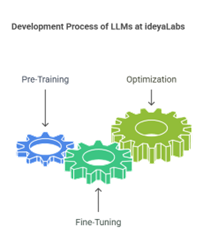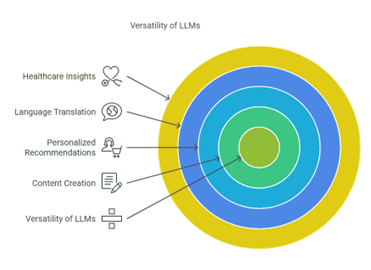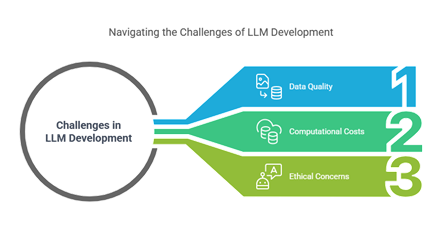The world of artificial intelligence (AI) is evolving at an unprecedented pace, and at the heart of this revolution lies the development of Large Language Models (LLMs). These transformative technologies are redefining how machines understand, interpret, and generate human language. At ideyaLabs, we specialize in harnessing the power of LLMs to help businesses unlock their true potential and stay ahead in a competitive landscape. If you’re curious about how these models work, their development process, and the immense opportunities they offer, you’re in the right place.
What Are Large Language Models?
Large Language Models are advanced AI systems designed to process and generate human-like text. Built on transformer architecture, these models analyze vast amounts of data to help us to understand complex linguistic patterns. At ideyaLabs, we leverage cutting-edge tools and frameworks to develop LLMs that excel in tasks ranging from text summarization to conversational AI with remarkable accuracy.
These models have become the backbone of applications like chatbots, virtual assistants, and content generation tools. Their ability to comprehend context and produce coherent responses makes them indispensable across industries such as healthcare, education, and customer service.
The Development Process: From Training to Fine-Tuning

Developing a high-performing LLM is no small feat. At ideyaLabs, we follow a meticulous process to ensure our models deliver exceptional results:
- Pre-Training: LLMs are trained on massive datasets sourced from diverse platforms such as Wikipedia, news articles, and open forums. This stage focuses on teaching the model basic language structures and patterns.
- Fine-Tuning: Once pre-trained, the model undergoes fine-tuning using domain-specific data. This step ensures that the LLM can handle specialized tasks with precision.
- Optimization: Advanced techniques like distributed training and mixed precision are employed to enhance model efficiency while managing computational costs.
Why Are LLMs Game-Changing?

The versatility of LLMs is what sets them apart. At ideyaLabs, we empower businesses with AI solutions that excel in tasks requiring contextual understanding, such as:
- Content Creation: Automating blog writing, social media posts, and marketing copy.
- Personalized Recommendations: Enhancing user experience in e-commerce and entertainment platforms.
- Language Translation: Breaking down language barriers with real-time translations.
- Healthcare Insights: Assisting medical professionals in diagnosing conditions through natural language queries.
Our expertise in developing adaptable LLMs ensures that businesses can leverage AI to drive innovation and growth.
Challenges in LLM Development

Despite their potential, building LLMs comes with its own set of challenges. At ideyaLabs, we address these hurdles with innovative solutions:
- Data Quality: The effectiveness of an LLM heavily depends on the quality of its training data. Poorly curated datasets can lead to biased or inaccurate outputs.
- Computational Costs: Training these models requires significant computational resources, often making it a costly endeavor.
- Ethical Concerns: Ensuring that LLMs generate responsible and unbiased content is an ongoing challenge for developers.
Our team at ideyaLabs combines technical expertise with ethical considerations to deliver AI solutions that are reliable, efficient, and responsible.
The Future of Large Language Models
As technology advances, the capabilities of LLMs will only continue to grow. At ideyaLabs, we are excited about emerging trends such as:
- Smaller but Smarter Models: Efforts are underway to make LLMs more efficient without sacrificing performance.
- Multimodal Capabilities: Integrating text with other data types like images and videos for richer outputs.
- Ethical AI Practices: Developing frameworks that prioritize fairness and transparency in AI-generated content.
The possibilities are endless, making now the perfect time for businesses to partner with ideyaLabs and explore how LLMs can transform their operations.